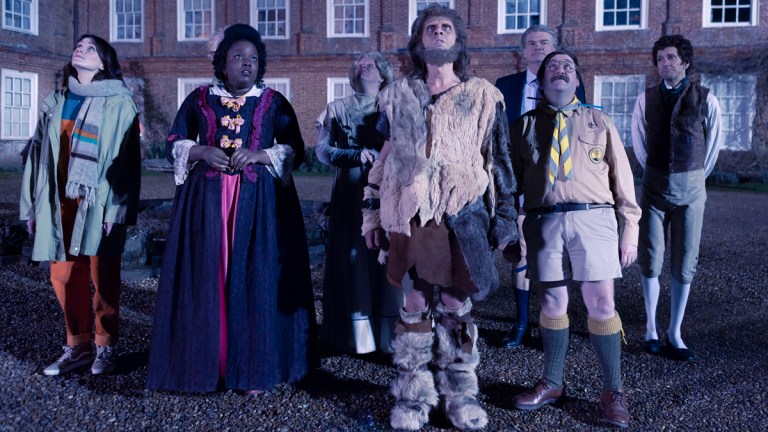BBC’s Ghosts Delivers Comedy’s Warmest, Wisest Reflection on Grief
Series 4 episode 4 ‘Gone Gone’ is a beautifully written comedic take on the different ways we deal with death.

Warning: contains spoilers for Ghosts Series 4 episode 4 ‘Gone Gone’.
The Ghosts are us. We are the Ghosts. That’s the foundation of this unimprovable British comedy, now four series in. We – the living – may have corporeal form (and with it the ability to dunk a biscuit, sorry, Pat) plus the freedom to occasionally leave our homes. They – the Ghosts – may have no earthly responsibilities and enjoy a comparatively less adversarial relationship with walls. But aside from that, we’re basically the same.
Give the living the gift of endless time and zero responsibilities, and we like to think that we’d write novels, compose symphonies and master every language Michel Thomas might care to teach us, but we wouldn’t. We’d do exactly what the Ghosts do – sit around, watch TV and complain about each other. We’re them. They’re us.
In Series 4 episode ‘Gone Gone’, directed by Simon Hynd, the Ghosts are more us than ever. Living through their own deaths, it turns out, hasn’t equipped them for losing somebody else. When Katy Wix’s Mary is unexpectedly “sucked off” mid-conversation and ascends to wherever’s next, the others are just as floored as we are when, in the middle of nothing, a loved one dies.
Not all of the Ghosts are floored by Mary’s early exit. Laurence Rickard’s stone-age Robin hears the news, shrugs, and carries on talking about baby mice. When he learns that Button House has a party booking that very afternoon, he’s jazzed. A party! Games! Dancing! Mary, who?
With no accounting for cavemen, the others demonstrate their grief in true-to-character form. Mat Baynton’s Romantic poet Thomas gets maudlin and makes it all about him. Ben Willbond’s Captain throws himself into pointless activity as a distraction. Simon Farnaby’s 90s MP Julian explodes with anger about unrelated trivial things. Martha Howe-Douglas’ Lady Button is ambushed by grief at a mundane moment. Lolly Adefope’s Kitty, the innocent of the group, bursts into tears, and Jim Howick’s Scoutmaster Pat tries to quell her crying with a series of comforting – and increasingly baroque – afterlife lies involving a kindly wizard and a realm of unicorns.
Anger, denial, depression, magical thinking… the Ghosts each demonstrate a classic grief behaviour. At times of bereavement, we’re all the Captain, trying to lose ourselves in busy work; or Julian kicking off over every little thing; or a weeping, inconsolable Kitty, or a parent making up any lies we can to comfort a bereft child. We’re all Lady Button too, reaching instinctively in an everyday moment for somebody who was always, always there and then being sideswept by the hollowing realisation that they’ve gone.
Charlotte Ritchie’s Alison, as ever, is the sensible glue holding the Button House family together. Realising the Ghosts aren’t coping with their loss, she plans a memorial service for Mary in the orchard. They gather to remember their friend with objects that remind them of her. Fennel – her favourite vegetable. A copy of the TV Times with cover stars The Loose Women – her favourite TV programme. A framed picture of Mike – her favourite person to spy on in the shower, all placed in a willow basket woven five potatoes high.
The memorial is a cleverly balanced scene – sad, fond, silly, and very Ghosts. During the minute’s silence for Mary, the sounds of Black Lace’s ‘Superman’ puncture the solemnity as Robin urges them all to come indoors and enjoy the kids’ party indoors. Just what is his problem, they ask? Is he not affected by losing Mary at all?
Robin’s been around a long time, he tells them. He deals with death his own way. Now come and enjoy the party.
And so they do – dancing to ‘Gangnam Style’ in a raucous game of musical statues, surrounded by the screaming chaos of 30 sugar-hyped kids. It couldn’t be less solemn, or less like Lady Button’s codified Edwardian mourning instructions (black armbands for the footmen, orchids in every bedroom…) and yet it’s the stupid release they need. It’s life.
Alison tells Mike she loves him and in an unspoken moment between them, we can tell that in the midst of death, they’re thinking about the continuation of life too. (Series five, please. We already know that babies can see Ghosts in this world. So much potential).
The episode’s most beautiful – and still not mawkish – scene comes at the end, when Robin shows that experience really is the mother of wisdom. Laurence Rickard’s character is a caveman, and the joke that he’s often more evolved than any of them never wears thin. He’s been at Button House longer than anyone and has lost so many people that he’s learned to channel the pain into his own ritual.
“This is what I do,” Robin tells the Ghosts standing under the night sky. “Every time one of us moves on, I find them a star. That’s where we go – whoosh – back to the stars.” He points at the stars in turn, naming the old friends that they memorialise. After rejecting Pat’s choice of the International Space Station for Mary, he chooses one with a twinkle and says goodbye. It’s a finely wrought resolution to an episode that’s pitched just so, and which is obviously the result of real human feeling poured into these lovably daft comedy archetypes.
Robin’s baby mice chat and dancing don’t make him callous; he’s showing us the way. Channel the pain, remember them, send love, and live. It’s the best any of us can do. Oppa Gangnam Style.
Ghosts Series 4 airs on Fridays on BBC One, with the official Inside… Ghosts podcast available after each episode on BBC Sounds.
